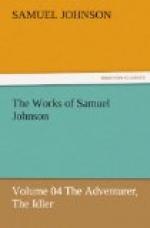There is, indeed, so little certainty in human affairs, that the most cautious and severe examiner may be allowed to indulge some hopes which he cannot prove to be much favoured by probability; since, after his utmost endeavours to ascertain events, he must often leave the issue in the hands of chance. And so scanty is our present allowance of happiness, that in many situations life could scarcely be supported, if hope were not allowed to relieve the present hour by pleasures borrowed from futurity; and reanimate the languor of dejection to new efforts, by pointing to distant regions of felicity, which yet no resolution or perseverance shall ever reach.
But these, like all other cordials, though they may invigorate in a small quantity, intoxicate in a greater; these pleasures, like the rest, are lawful only in certain circumstances, and to certain degrees; they may be useful in a due subserviency to nobler purposes, but become dangerous and destructive when once they gain the ascendant in the heart: to soothe the mind to tranquillity by hope, even when that hope is likely to deceive us, may be sometimes useful; but to lull our faculties in a lethargy is poor and despicable.
Vices and errours are differently modified, according to the state of the minds to which they are incident; to indulge hope beyond the warrant of reason, is the failure alike of mean and elevated understandings; but its foundation and its effects are totally different: the man of high courage and great abilities is apt to place too much confidence in himself, and to expect, from a vigorous exertion of his powers, more than spirit or diligence can attain: between him and his wish he sees obstacles indeed, but he expects to overleap or break them; his mistaken ardour hurries him forward; and though, perhaps, he misses his end, he nevertheless obtains some collateral good, and performs something useful to mankind, and honourable to himself.
The drone of timidity presumes likewise to hope, but without ground and without consequence; the bliss with which he solaces his hours he always expects from others, though very often he knows not from whom: he folds his arms about him, and sits in expectation of some revolution in the state that shall raise him to greatness, or some golden shower that shall load him with wealth; he dozes away the day in musing upon the morrow; and at the end of life is roused from his dream only to discover that the time of action is past, and that he can now shew his wisdom only by repentance.
No. 74. SATURDAY, JULY 21, 1753.
Insanientis dun sapientae
Consultus erro.— HOR.
Lib. i. Od. xxxiv. 2.
I miss’d my end, and lost my way,
By crack-brain’d wisdom led astray.
TO THE ADVENTURER.
SIR,
It has long been charged by one part of mankind upon the other, that they will not take advice; that counsel and instruction are generally thrown away; and that, in defiance both of admonition and example, all claim the right to choose their own measures, and to regulate their own lives.




